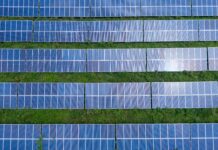Doug Young
Bottom line: The latest EU anti-dumping probe into Chinese solar panels is likely to find that manufacturers violated a previous agreement, which could result in new punitive tariffs by the end of this year.
In a move that will surprise to no one, the European Union has formally launched a probe into Chinese solar panel makers who are being accused by European rivals of violating a landmark agreement that averted anti-dumping tariffs. I should really stop using the word “landmark” to describe the 2013 deal between the Chinese panel makers and EU that avoided a trade war. In fact, it’s becoming increasingly obvious that a better word to describe the deal would be “foolish”, since it appears many of the Chinese panel makers never really intended to follow the spirit of the agreement to begin with.
The bottom line is that the agreement signed in late 2013, which averted punitive tariffs against Chinese solar panels, is likely to be declared void by the end of this year. I personally didn’t predict this outcome, and at the time I actually congratulated both sides on finding a more productive way to resolve their trade disputes than the usual punitive tariffs. But it seems Chinese companies aren’t ready for this kind of mediated settlement, since the only language they seem to understand is actual punishment.
According to the latest reports, the European Commission, which represents the 28 EU member countries on trade issues, has formally opened an inquiry into whether the Chinese panel makers deliberately took steps to violate the 2013 agreement. (English article) That deal saw the manufacturers agree to voluntarily raise their prices to levels similar to their European rivals, who complained that the Chinese got unfair state subsidies through policies like cheap government loans and export subsidies.
The agreement was strongly supported by several prominent leaders of EU countries, and came after Europe conducted an investigation and had threatened punitive tariffs. But less than a year later, European panel makers began to complain that Chinese were circumventing the deal using a number of tricks, such as offering refunds to customers through fake consulting contracts.
The complaint that prompted the European Commission to launch its latest investigation was made by German manufacturer Solarworld (Frankfurt: SWVK, OTC:SRWRF), and involves yet another tactic that Chinese panel makers allegedly used to avoid their own promised price hikes. In that instance, Solarworld claims the Chinese would transship their panels to Europe by via other places like Taiwan and Malaysia, making them appear to be manufactured in those other places and therefore exempt from the promised price hikes.
Following its agreement to investigate the matter, the European Commission could take as long as 9 months to reach its conclusions, the reports say. But I expect that the probe won’t take nearly that long, as it should be quite easy to determine if big changes have occurred in panel shipment patterns since the EU signed its agreement with the Chinese panel makers less than 2 years ago.
At the end of the day, the US comes out looking the smartest in this whole situation, as it was the first to start investigating Chinese solar panel makers 3 years ago and later levied its own punitive sanctions. I don’t know if any attempts were made to avoid those sanctions through a negotiated settlement like the one with Europe. But I suspect that experienced trade officials in Washington were familiar with the tactics used by Chinese companies, and simply decided to levy the sanctions because they knew a negotiated settlement was likely to run into this kind of problem.
At the end of the day, the only real longer-term solution is for China to end this kind of state support that too often results in trade wars. That won’t be easy, as this kind of support has a long tradition in China due to the country’s socialist past when all businesses were owned by the state. But until that happens, this kind of trade war will continue, and western countries are unlikely to try the negotiated settlement approach again after this failed experiment in Europe.
Doug Young has lived and worked in China for 15 years, much of that as a journalist for Reuters writing about Chinese companies. He currently lives in Shanghai where he teaches financial journalism at Fudan University. He writes daily on his blog, Young´s China Business Blog, commenting on the latest developments at Chinese companies listed in the US, China and Hong Kong. He is also author of a new book about the media in China, The Party Line: How The Media Dictates Public Opinion in Modern China.






